Uber vs Bolt Price Comparison for Drivers in 2025
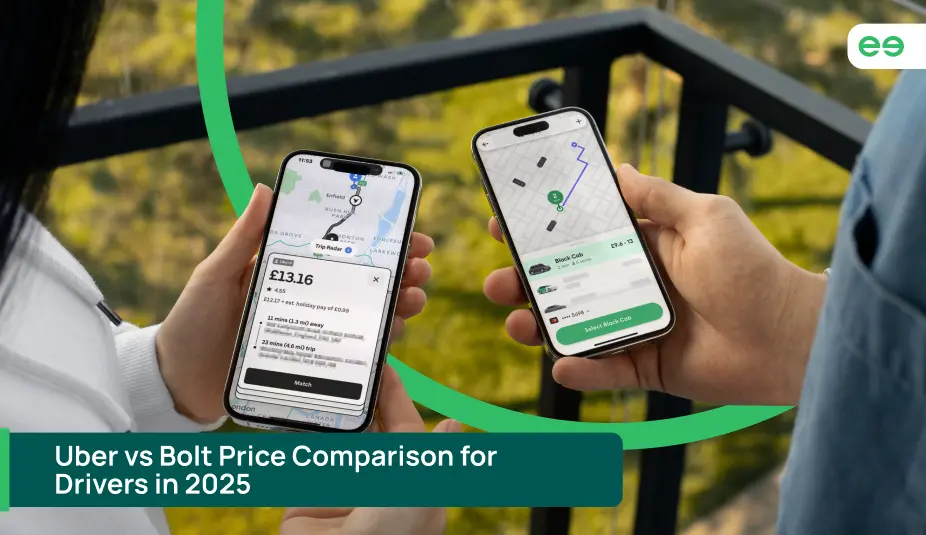
In 2025, ride-hailing continues to be a competitive industry in the UK, with Uber and Bolt remaining two of the most popular platforms for riders and drivers. While passengers often focus on convenience and cost, drivers are more concerned with earnings, commission rates, bonuses, and platform support.
That’s why, understanding how Uber and Bolt compare is key to making smarter decisions as a driver. This comparison becomes even more important for those using PCO car hire services, where every pound counts to stay on the road.
In this guide, we break down exactly how much each platform pays so you know what to expect for every ride you complete.
Article Highlights
This guide covers everything you need to know about Uber and Bolt’s:
- Commission structure
- Base fare
- Booking fee
- Surge pricing and promotions
- Payout frequency
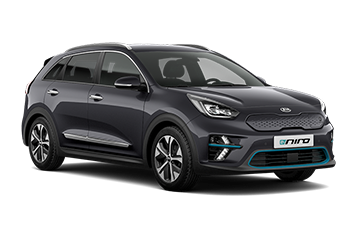


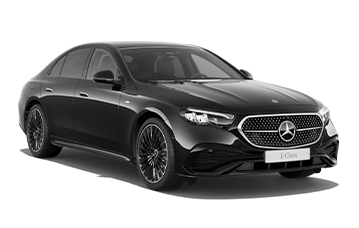
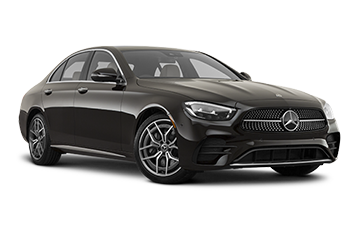
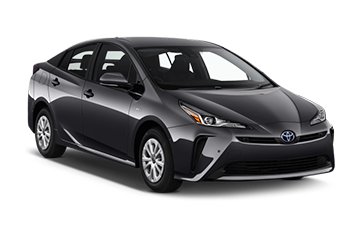
Commission Structure
One of the most important things drivers look at is how much commission each platform takes from every ride.
- Uber takes a flat 25% commission on each ride. So, if you earn £20 from a fare, £5 goes to Uber in commission.
- Bolt, on the other hand, charges between 15% and 20%, depending on location and driver performance. This means you keep more of what you earn, especially if you’re working full-time or taking on longer shifts.
While 5 to 10% may not sound like much per trip, it can add up to hundreds of pounds in extra income over a week or month.
Verdict: Bolt wins this round by offering lower commissions and letting drivers keep more per ride.
Base Fare
Let’s break down what a typical trip pays on Uber and Bolt based on distance and duration.
Uber pays:
- Base fare: £2.50
- £0.15 per minute
- £1.25 per mile
Bolt pays:
- Base fare: £2.80
- £0.10-£0.15 per minute
- £1.10 per mile
While Uber offers higher per-mile and per-minute rates, Bolt’s higher base fare helps make short trips more profitable. This can lead to better average earnings per trip in areas where short rides are more common.
Verdict: Bolt has a slight edge. However, Uber can still be competitive on longer journeys.
Driver Tip from Fleeto:
Pairing a hybrid or electric vehicle with Bolt’s lower commission and higher base fare can make shorter trips more profitable, and we’ve got the ideal cars ready for you. Ask us which model suits your route best.
Booking Fee
This fee is added to the rider’s fare, but not paid to the driver.
- Uber charges a booking fee of around £1.50 to £2.50. Drivers don’t receive this amount, even though it appears in the total fare shown to riders.
- Bolt has no booking fee, making it an attractive and cost-saving option for passengers and more transparent for drivers.
Example:
Let’s say you get a £10 Uber ride:
- 25% commission = £2.50
- Booking fee = £2.00 (not paid to driver)
- You receive about £5.50–£6.00 before expenses.
Now compare it with a £10 Bolt ride:
- 15%-20% commission = £1.50-£2.00
- You receive about £8.00–£8.50 before expenses.
Verdict: Bolt is more driver-friendly by not deducting a booking fee and taking a smaller commission.
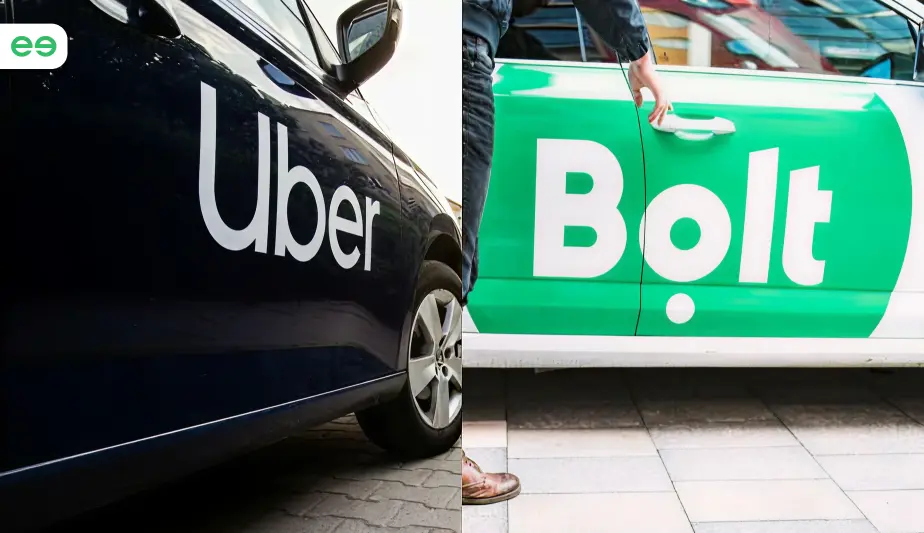
Surge Pricing and Promotions
Uber and Bolt use surge pricing to reward drivers during peak hours, but they do it differently.
- Uber fares can increase by 2.5 times or even more during a surge. That means a ride that usually pays around £10 could pay £25 or more during a surge.
- Uber also offers promotions like:
- Quest bonuses that allow you to earn extra cash for completing a set number of trips in a timeframe.
- Boost zones where your fares multiply by a set percentage in certain areas, regardless of surge.
- Bolt fares typically surge to 1.5x-2x, which is lower than Uber’s.
- Bolt offers consistent weekly bonuses, such as extra earnings for completing 30+ rides or maintaining a low cancellation rate. Promotions may vary based on the location and driver rating.
Verdict: Uber can offer bigger payouts during busy hours, but its bonuses are sometimes harder to achieve. Bolt provides steady incentives that are easier to plan around.
Want to know how much Uber drivers earn in London? Read our detailed guide here.


Explore the Numbers Behind Uber vs Bolt.
Get the facts and boost your earnings as a PCO driver.
Payout Frequency
Getting paid quickly is important, especially for drivers managing ongoing expenses like fuel and rent for the PCO car hire or rent to buy services. Here’s how the payout system works on the two platforms:
Uber
- Weekly payouts by default, usually on Wednesday.
- Instant Pay is available 6 times daily for £0.50 per transaction.
- Minimum cash-out: £1.
- Max per week: £2,000.
Bolt
- Weekly automatic payouts on Tuesday or Wednesday, depending on your bank.
- Bolt currently doesn’t offer early cashout option in most UK cities. In the cities where it’s available, you need to:
- Complete at least 25 trips in the last two months.
- Have an active Bolt account.
- Use the app version DI 12.0, DA 13.0, or newer.
Verdict: Uber wins here as you can cash out multiple times daily.
Typical Fare Example (Short Ride, 2 Miles, 10 Minutes)
| Component | Uber Estimate | Bolt Estimate |
| Base Fare | £2.50 | £2.80 |
| Distance (2 miles) | £2.50 | £2.20 |
| Time (10 minutes) | £1.50 | £1.50 |
| Booking Fee | £2.00 | £0.00 |
| Total Fare after Commission & Booking Fee | £4.375 | £5.525 |
Note: The rates may differ due to surge pricing and promotions.

Start Earning Today.
Summary: Which One is Better?
Both Uber and Bolt have their strengths.
- Bolt is more profitable per ride due to low commission. However, its ride volume is generally lower than Uber’s, meaning there may be longer gaps between trips, especially outside of peak hours or in less busy areas.
- Uber offers more ride opportunities due to its larger customer base. It also has higher surge pricing, which can boost your earnings considerably, sometimes doubling or even tripling normal fares if you’re in the right place at the right time.
Smart drivers use both platforms. If one app goes quiet, the other might be busy, helping minimise wait times and maximise income.
Frequently Asked Questions
Is Bolt cheaper than Uber?
Bolt charges 15%-20% commission compared to Uber’s 25%, which makes it more profitable per ride for PCO drivers.
Should I drive for Uber or Bolt in London?
Consider driving for both platforms. This way, you can switch between them when demand is low on one, maximising your earnings.
Do Uber prices surge after 11 pm?
It depends on the demand and driver availability. Many drivers log off after 11 pm. So, if the driver demand is higher than the number of drivers available, then the prices may surge.
Suggested Blogs
To get more information like this
Subscribe to our newsletter
Choosing Between Uber and Bolt Doesn’t Have to Be a Gamble. With Fleeto, It’s a Safe Choice!
We’ll match you with a fuel-efficient, fully licensed PCO car that suits your driving style, whether you’re chasing Bolt bonuses or Uber surges. Our flexible hire plans, vehicle swaps, and fast support mean you can adapt to the market and always stay earning.
Ready to drive smarter in 2025? Apply with Fleeto today and get on the road to higher income.

